- Download Price:
- Free
- Dll Description:
- Network Monitor NDIS Network Packet Provider
- Versions:
- Size:
- 0.03 MB
- Operating Systems:
- Directory:
- N
- Downloads:
- 977 times.
What is Ndisnpp.dll?
The Ndisnpp.dll file is 0.03 MB. The download links are current and no negative feedback has been received by users. It has been downloaded 977 times since release.
Table of Contents
- What is Ndisnpp.dll?
- Operating Systems Compatible with the Ndisnpp.dll File
- All Versions of the Ndisnpp.dll File
- Steps to Download the Ndisnpp.dll File
- How to Install Ndisnpp.dll? How to Fix Ndisnpp.dll Errors?
- Method 1: Installing the Ndisnpp.dll File to the Windows System Folder
- Method 2: Copying the Ndisnpp.dll File to the Software File Folder
- Method 3: Doing a Clean Install of the software That Is Giving the Ndisnpp.dll Error
- Method 4: Solving the Ndisnpp.dll Error using the Windows System File Checker (sfc /scannow)
- Method 5: Fixing the Ndisnpp.dll Error by Manually Updating Windows
- Common Ndisnpp.dll Errors
- Other Dll Files Used with Ndisnpp.dll
Operating Systems Compatible with the Ndisnpp.dll File
All Versions of the Ndisnpp.dll File
The last version of the Ndisnpp.dll file is the 5.2.3790.3959 version. Before this version, there were 1 versions released. Downloadable Ndisnpp.dll file versions have been listed below from newest to oldest.
- 5.2.3790.3959 - 32 Bit (x86) Download directly this version
- 5.1.2600.2180 - 32 Bit (x86) (2012-07-31) Download directly this version
Steps to Download the Ndisnpp.dll File
- Click on the green-colored "Download" button on the top left side of the page.
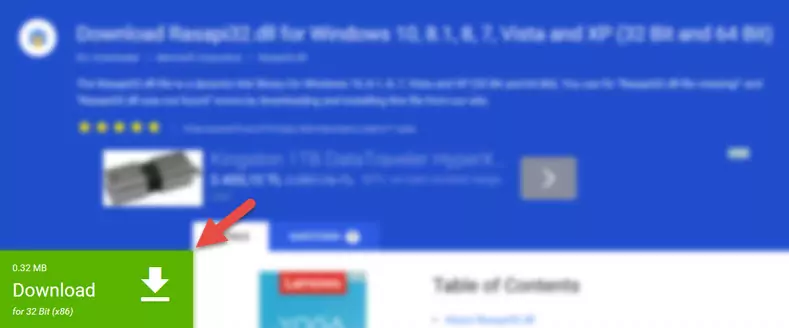
Step 1:Download process of the Ndisnpp.dll file's - "After clicking the Download" button, wait for the download process to begin in the "Downloading" page that opens up. Depending on your Internet speed, the download process will begin in approximately 4 -5 seconds.
How to Install Ndisnpp.dll? How to Fix Ndisnpp.dll Errors?
ATTENTION! Before starting the installation, the Ndisnpp.dll file needs to be downloaded. If you have not downloaded it, download the file before continuing with the installation steps. If you don't know how to download it, you can immediately browse the dll download guide above.
Method 1: Installing the Ndisnpp.dll File to the Windows System Folder
- The file you will download is a compressed file with the ".zip" extension. You cannot directly install the ".zip" file. Because of this, first, double-click this file and open the file. You will see the file named "Ndisnpp.dll" in the window that opens. Drag this file to the desktop with the left mouse button. This is the file you need.
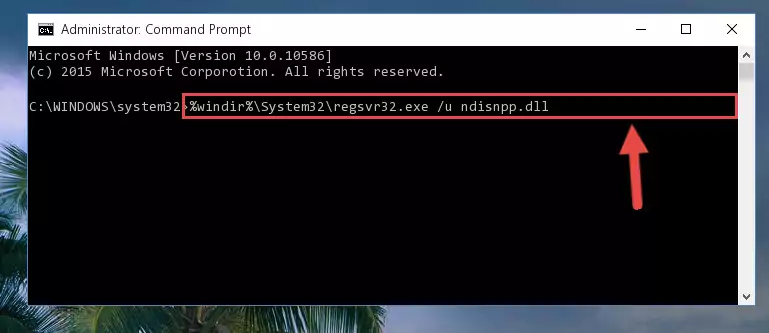
Step 1:Extracting the Ndisnpp.dll file from the .zip file - Copy the "Ndisnpp.dll" file and paste it into the "C:\Windows\System32" folder.
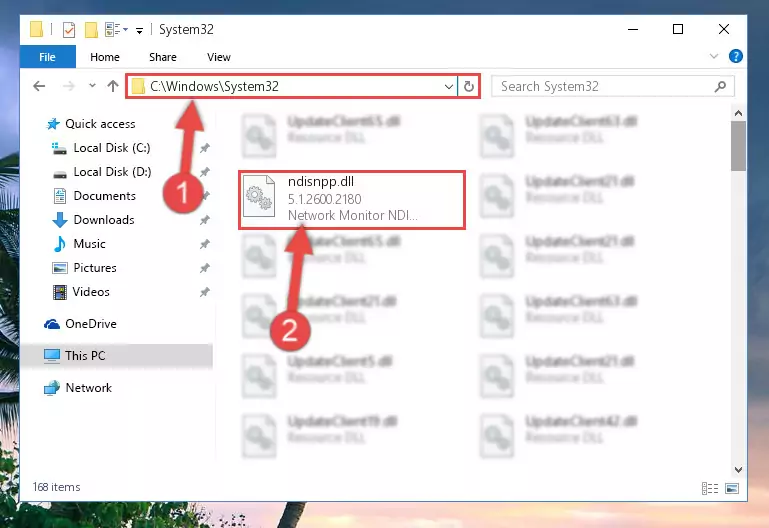
Step 2:Copying the Ndisnpp.dll file into the Windows/System32 folder - If your system is 64 Bit, copy the "Ndisnpp.dll" file and paste it into "C:\Windows\sysWOW64" folder.
NOTE! On 64 Bit systems, you must copy the dll file to both the "sysWOW64" and "System32" folders. In other words, both folders need the "Ndisnpp.dll" file.
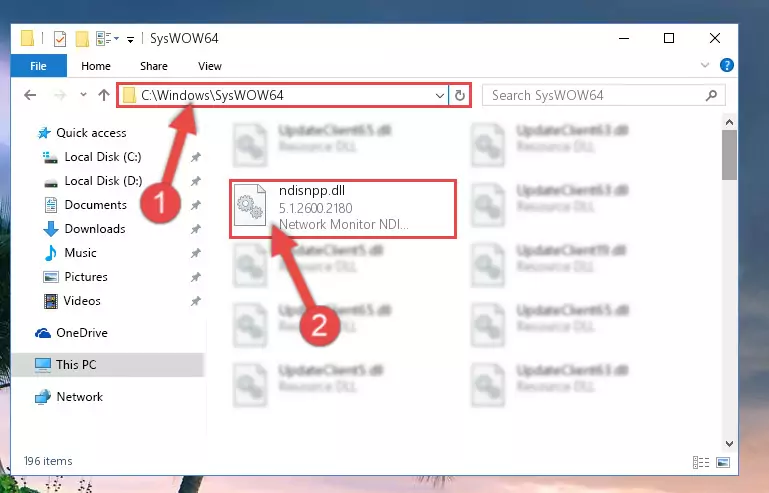
Step 3:Copying the Ndisnpp.dll file to the Windows/sysWOW64 folder - In order to run the Command Line as an administrator, complete the following steps.
NOTE! In this explanation, we ran the Command Line on Windows 10. If you are using one of the Windows 8.1, Windows 8, Windows 7, Windows Vista or Windows XP operating systems, you can use the same methods to run the Command Line as an administrator. Even though the pictures are taken from Windows 10, the processes are similar.
- First, open the Start Menu and before clicking anywhere, type "cmd" but do not press Enter.
- When you see the "Command Line" option among the search results, hit the "CTRL" + "SHIFT" + "ENTER" keys on your keyboard.
- A window will pop up asking, "Do you want to run this process?". Confirm it by clicking to "Yes" button.
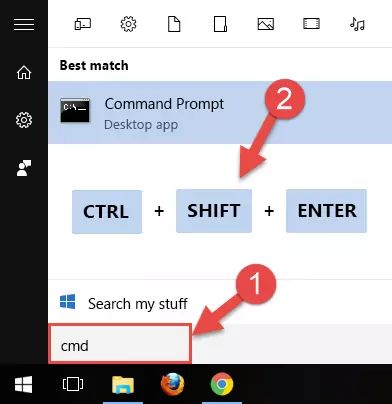
Step 4:Running the Command Line as an administrator - Paste the command below into the Command Line window that opens up and press Enter key. This command will delete the problematic registry of the Ndisnpp.dll file (Nothing will happen to the file we pasted in the System32 folder, it just deletes the registry from the Windows Registry Editor. The file we pasted in the System32 folder will not be damaged).
%windir%\System32\regsvr32.exe /u Ndisnpp.dll
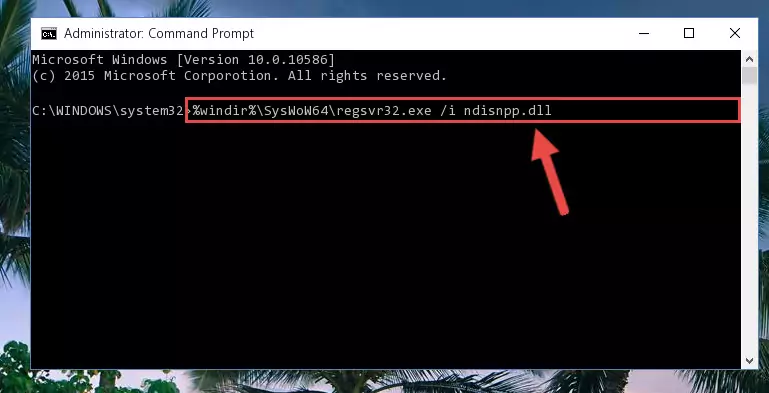
Step 5:Cleaning the problematic registry of the Ndisnpp.dll file from the Windows Registry Editor - If you are using a 64 Bit operating system, after doing the commands above, you also need to run the command below. With this command, we will also delete the Ndisnpp.dll file's damaged registry for 64 Bit (The deleting process will be only for the registries in Regedit. In other words, the dll file you pasted into the SysWoW64 folder will not be damaged at all).
%windir%\SysWoW64\regsvr32.exe /u Ndisnpp.dll
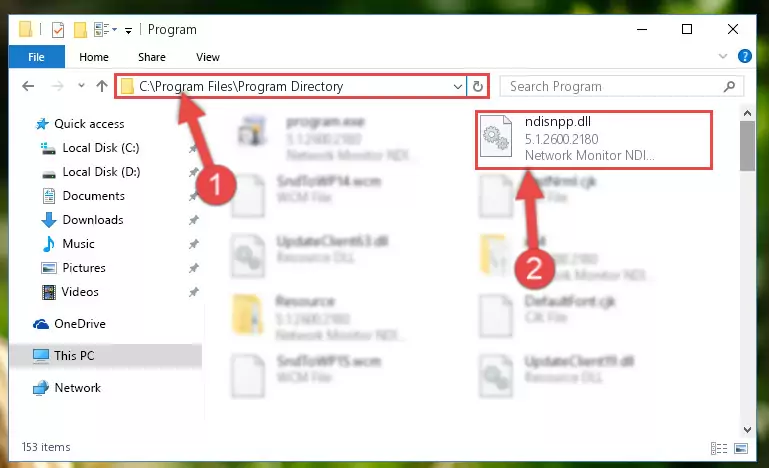
Step 6:Uninstalling the damaged Ndisnpp.dll file's registry from the system (for 64 Bit) - You must create a new registry for the dll file that you deleted from the registry editor. In order to do this, copy the command below and paste it into the Command Line and hit Enter.
%windir%\System32\regsvr32.exe /i Ndisnpp.dll
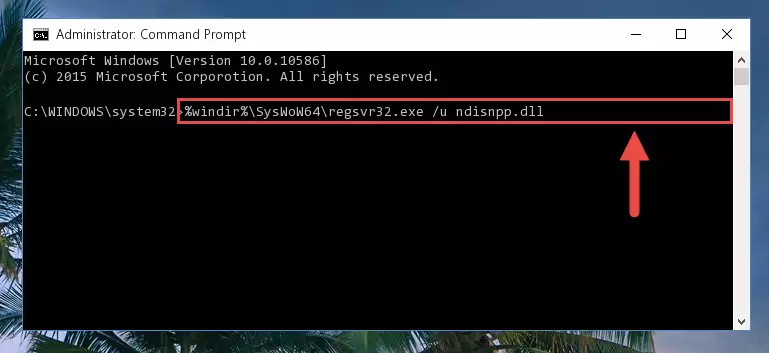
Step 7:Creating a new registry for the Ndisnpp.dll file - If the Windows version you use has 64 Bit architecture, after running the command above, you must run the command below. With this command, you will create a clean registry for the problematic registry of the Ndisnpp.dll file that we deleted.
%windir%\SysWoW64\regsvr32.exe /i Ndisnpp.dll
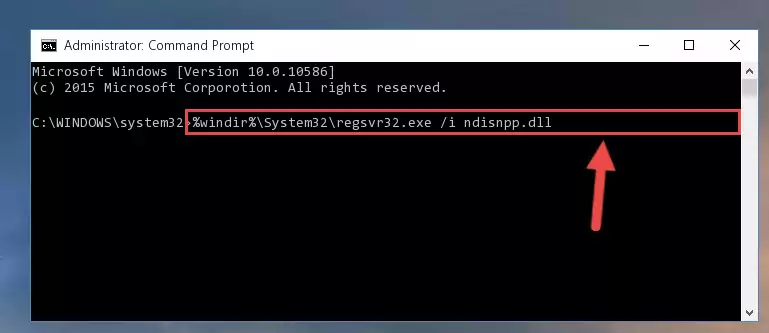
Step 8:Creating a clean registry for the Ndisnpp.dll file (for 64 Bit) - If you did the processes in full, the installation should have finished successfully. If you received an error from the command line, you don't need to be anxious. Even if the Ndisnpp.dll file was installed successfully, you can still receive error messages like these due to some incompatibilities. In order to test whether your dll problem was solved or not, try running the software giving the error message again. If the error is continuing, try the 2nd Method to solve this problem.
Method 2: Copying the Ndisnpp.dll File to the Software File Folder
- First, you must find the installation folder of the software (the software giving the dll error) you are going to install the dll file to. In order to find this folder, "Right-Click > Properties" on the software's shortcut.
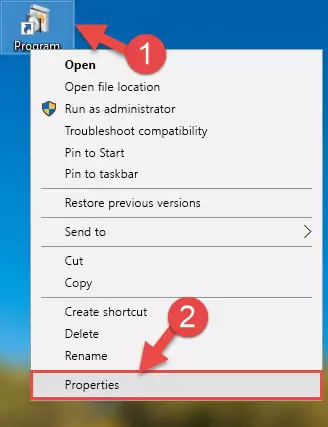
Step 1:Opening the software's shortcut properties window - Open the software file folder by clicking the Open File Location button in the "Properties" window that comes up.
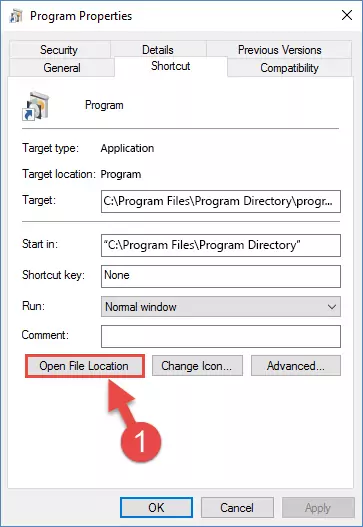
Step 2:Finding the software's file folder - Copy the Ndisnpp.dll file into the folder we opened.
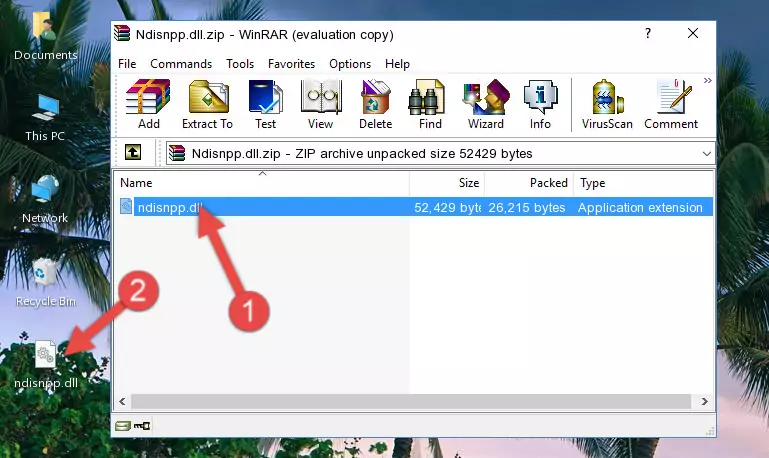
Step 3:Copying the Ndisnpp.dll file into the file folder of the software. - The installation is complete. Run the software that is giving you the error. If the error is continuing, you may benefit from trying the 3rd Method as an alternative.
Method 3: Doing a Clean Install of the software That Is Giving the Ndisnpp.dll Error
- Open the Run window by pressing the "Windows" + "R" keys on your keyboard at the same time. Type in the command below into the Run window and push Enter to run it. This command will open the "Programs and Features" window.
appwiz.cpl
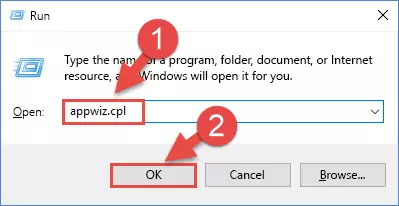
Step 1:Opening the Programs and Features window using the appwiz.cpl command - The Programs and Features window will open up. Find the software that is giving you the dll error in this window that lists all the softwares on your computer and "Right-Click > Uninstall" on this software.
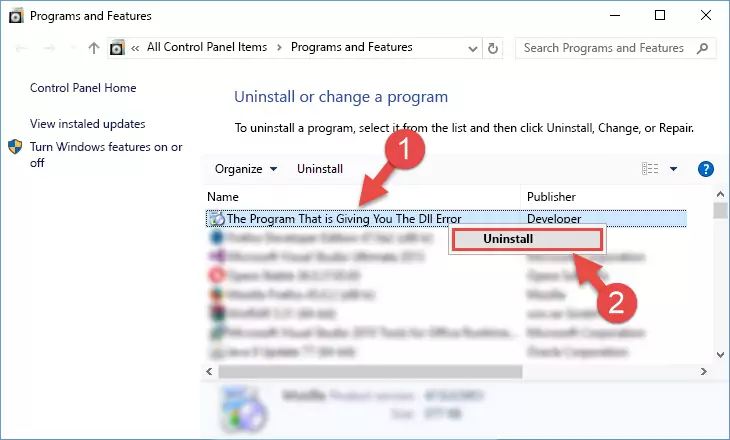
Step 2:Uninstalling the software that is giving you the error message from your computer. - Uninstall the software from your computer by following the steps that come up and restart your computer.
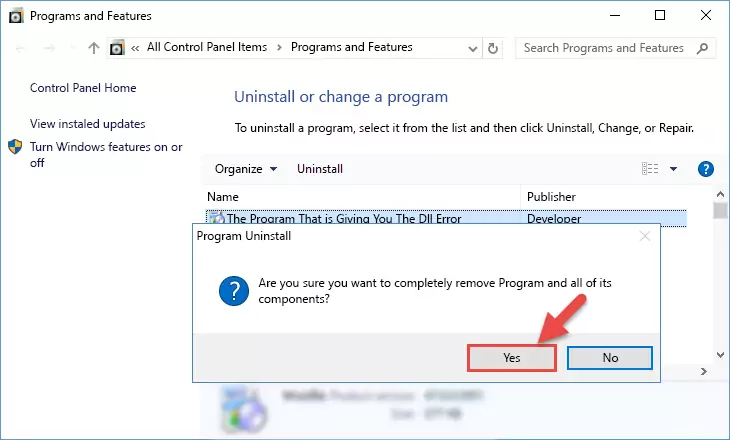
Step 3:Following the confirmation and steps of the software uninstall process - After restarting your computer, reinstall the software that was giving the error.
- You can solve the error you are expericing with this method. If the dll error is continuing in spite of the solution methods you are using, the source of the problem is the Windows operating system. In order to solve dll errors in Windows you will need to complete the 4th Method and the 5th Method in the list.
Method 4: Solving the Ndisnpp.dll Error using the Windows System File Checker (sfc /scannow)
- In order to run the Command Line as an administrator, complete the following steps.
NOTE! In this explanation, we ran the Command Line on Windows 10. If you are using one of the Windows 8.1, Windows 8, Windows 7, Windows Vista or Windows XP operating systems, you can use the same methods to run the Command Line as an administrator. Even though the pictures are taken from Windows 10, the processes are similar.
- First, open the Start Menu and before clicking anywhere, type "cmd" but do not press Enter.
- When you see the "Command Line" option among the search results, hit the "CTRL" + "SHIFT" + "ENTER" keys on your keyboard.
- A window will pop up asking, "Do you want to run this process?". Confirm it by clicking to "Yes" button.

Step 1:Running the Command Line as an administrator - Type the command below into the Command Line page that comes up and run it by pressing Enter on your keyboard.
sfc /scannow
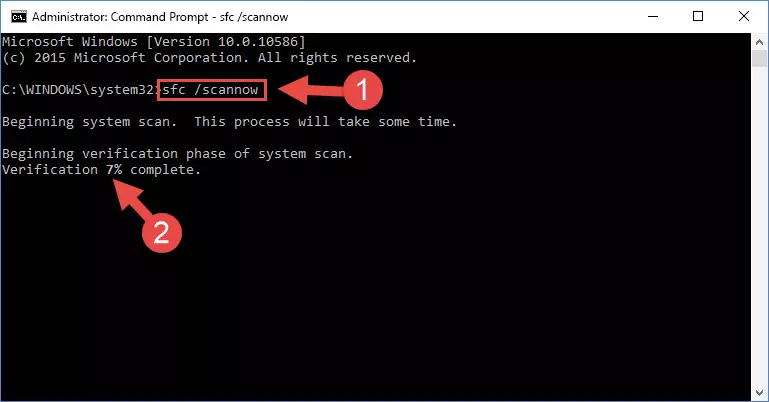
Step 2:Getting rid of Windows Dll errors by running the sfc /scannow command - The process can take some time depending on your computer and the condition of the errors in the system. Before the process is finished, don't close the command line! When the process is finished, try restarting the software that you are experiencing the errors in after closing the command line.
Method 5: Fixing the Ndisnpp.dll Error by Manually Updating Windows
Some softwares need updated dll files. When your operating system is not updated, it cannot fulfill this need. In some situations, updating your operating system can solve the dll errors you are experiencing.
In order to check the update status of your operating system and, if available, to install the latest update packs, we need to begin this process manually.
Depending on which Windows version you use, manual update processes are different. Because of this, we have prepared a special article for each Windows version. You can get our articles relating to the manual update of the Windows version you use from the links below.
Explanations on Updating Windows Manually
Common Ndisnpp.dll Errors
It's possible that during the softwares' installation or while using them, the Ndisnpp.dll file was damaged or deleted. You can generally see error messages listed below or similar ones in situations like this.
These errors we see are not unsolvable. If you've also received an error message like this, first you must download the Ndisnpp.dll file by clicking the "Download" button in this page's top section. After downloading the file, you should install the file and complete the solution methods explained a little bit above on this page and mount it in Windows. If you do not have a hardware problem, one of the methods explained in this article will solve your problem.
- "Ndisnpp.dll not found." error
- "The file Ndisnpp.dll is missing." error
- "Ndisnpp.dll access violation." error
- "Cannot register Ndisnpp.dll." error
- "Cannot find Ndisnpp.dll." error
- "This application failed to start because Ndisnpp.dll was not found. Re-installing the application may fix this problem." error
